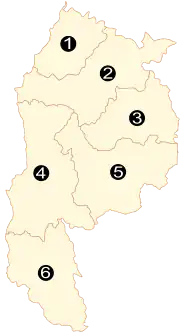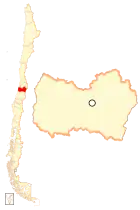Cardenal Caro Province
Cardenal Caro Province (Spanish: Provincia Cardenal Caro[5]) is one of the three provinces of the central Chilean region of O'Higgins (VI). The capital of Cardenal Caro is Pichilemu.[6]
Cardenal Caro Province
Provincia Cardenal Caro | |
|---|---|
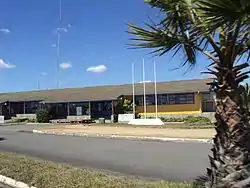 Government of Cardenal Caro Province building, on March 12, 2011. | |
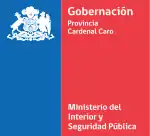 Seal  Coat of arms | |
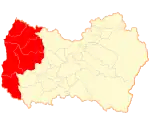 Location of Cardenal Caro Province in the Libertador General Bernardo O'Higgins Region | |
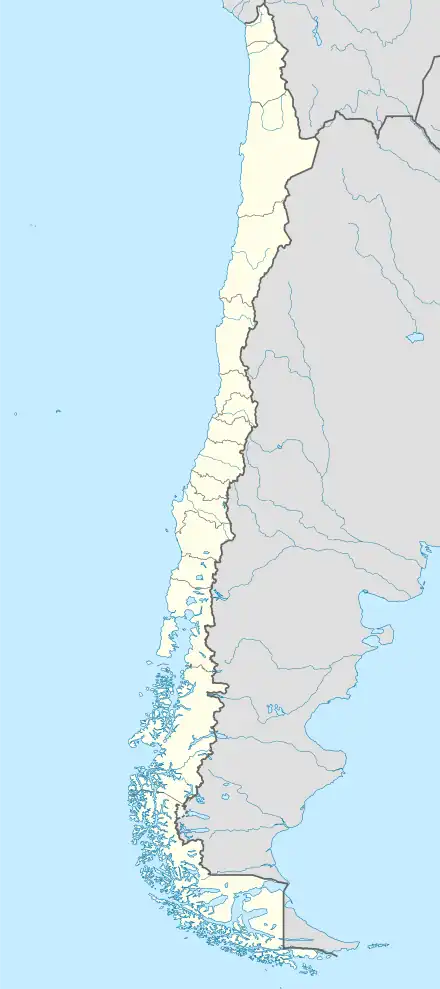 Cardenal Caro Province Location in Chile | |
| Coordinates: 34°22′S 71°51′W | |
| Country | Chile |
| Region | O'Higgins |
| Founded | October 3, 1979[1] |
| Capital | Pichilemu |
| Communes | |
| Government | |
| • Type | Provincial |
| • Presidential Provincial Delegate | Carlos Cisterna Pavez (Socialist Party) |
| Area | |
| • Total | 3,324.8 km2 (1,283.7 sq mi) |
| Population (2012 Census)[2] | |
| • Total | 39,068 |
| • Density | 12/km2 (30/sq mi) |
| • Urban | 18,433 |
| • Rural | 22,727 |
| Sex | |
| • Men | 22,127 |
| • Women | 19,033 |
| Time zone | UTC-4 (CLT[3]) |
| • Summer (DST) | UTC-3 (CLST[4]) |
| Area code | 56 + 72 |
| Website | Government of Cardenal Caro |
Name
The province is named after Cardinal José María Caro Rodríguez, native of Pichilemu, and who was the first Cardinal of Chile.
History
On July 13, 1973, President Salvador Allende Gossens decreed the creation of the Cardenal Caro Department. The decree was published in the Diario Oficial de la República de Chile in August of the same year, making it official.[1] Marchigüe was declared the capital. However, the coup d'état that occurred in September of that year made the decree "dead text".[1]
The province of Cardenal Caro was created on October 3, 1979 by General Augusto Pinochet.[1] The communes of Litueche (formerly El Rosario), La Estrella, Marchigüe, Paredones, and Pichilemu, originally from Colchagua Province; and Navidad, originally from San Antonio Province, formed the province.[1]
Administration
As a province, Cardenal Caro is a second-level administrative division of Chile, governed by a provincial delegate who is appointed by the president. Before 2021, the province was administered by the governor of Cardenal Caro, also appointed by the president of the Republic. Since that year, it is administered by the presidential provincial delegate of Cardenal Caro. The province is composed by six communes (Spanish: comunas), each of which is governed by a popularly elected alcalde.
Geography and demography
According to the 2002 census by the National Statistics Institute (INE), the province spans an area of 3,324.7 km2 (1,284 sq mi)[2] and had a population of 41,160 inhabitants (22,127 men and 19,033 women), giving it a population density of 12.4/km2 (32/sq mi). Between the 1992 and 2002 censuses, the population grew by 11.2% (4,151 persons). persons).[2]
See also
Further reading
- Grez-Cañete, Diego (2016). Provincia Cardenal Caro: institucionalidad y autoridades locales (in Spanish). Pichilemu, Chile: El Marino Producciones. ISBN 9789569757037. LCCN 2017497613.
References
- Saldías, Washington (2005-10-03). "Provincia Cardenal Caro de cumpleaños" (in Spanish). Pichilemu, Chile: Pichilemu News. Archived from the original on 2012-03-01. Retrieved 2010-11-09.
- "Territorial division of Chile" (PDF) (in Spanish). National Statistics Institute. 2007. Archived from the original (PDF) on 2010-11-14. Retrieved 2011-03-19.
- "Chile Time". WorldTimeZones.org. Archived from the original on 2007-09-11. Retrieved 2010-07-28.
- "Chile Summer Time". WorldTimeZones.org. Archived from the original on 2007-09-11. Retrieved 2010-07-28.
- "Biblioteca del Congreso Nacional | Ley Chile".
- "Información Cívica" (in Spanish). Pichilemu, Chile: Government of Cardenal Caro Province. 2010. Archived from the original on 2011-07-07. Retrieved 2010-11-09.
External links
- Government of Cardenal Caro (in Spanish)
